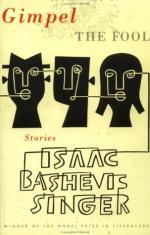|
This section contains 1,672 words (approx. 5 pages at 400 words per page) |

|
Siegel is an American critic who has written extensively on English Renaissance literature and the works of William Shakespeare. In the following excerpt, Siegel views the protagonist and narrator of Singer's short story "Gimpel the Fool" as an ironic example of the archetypal wise- or sainted-fool figure in literature.
"Gimpel the Fool," perhaps the most widely acclaimed work of Isaac Bashevis Singer, has its roots deep in the soil of Yiddish literature. It is concerned with two of what Irving Howe and Eliezer Greenberg tell us, in their Treasury of Yiddish Stories, are "the great themes of Yiddish literature," "the virtue of powerlessness" and "the sanctity of the insulted and the injured," and has as its anti-hero the "wise or sainted fool" who is an "extreme variation" of "the central figure of Yiddish literature," "dos kleine menschele, the little man." The wise or sainted fool is, however...
|
This section contains 1,672 words (approx. 5 pages at 400 words per page) |

|




